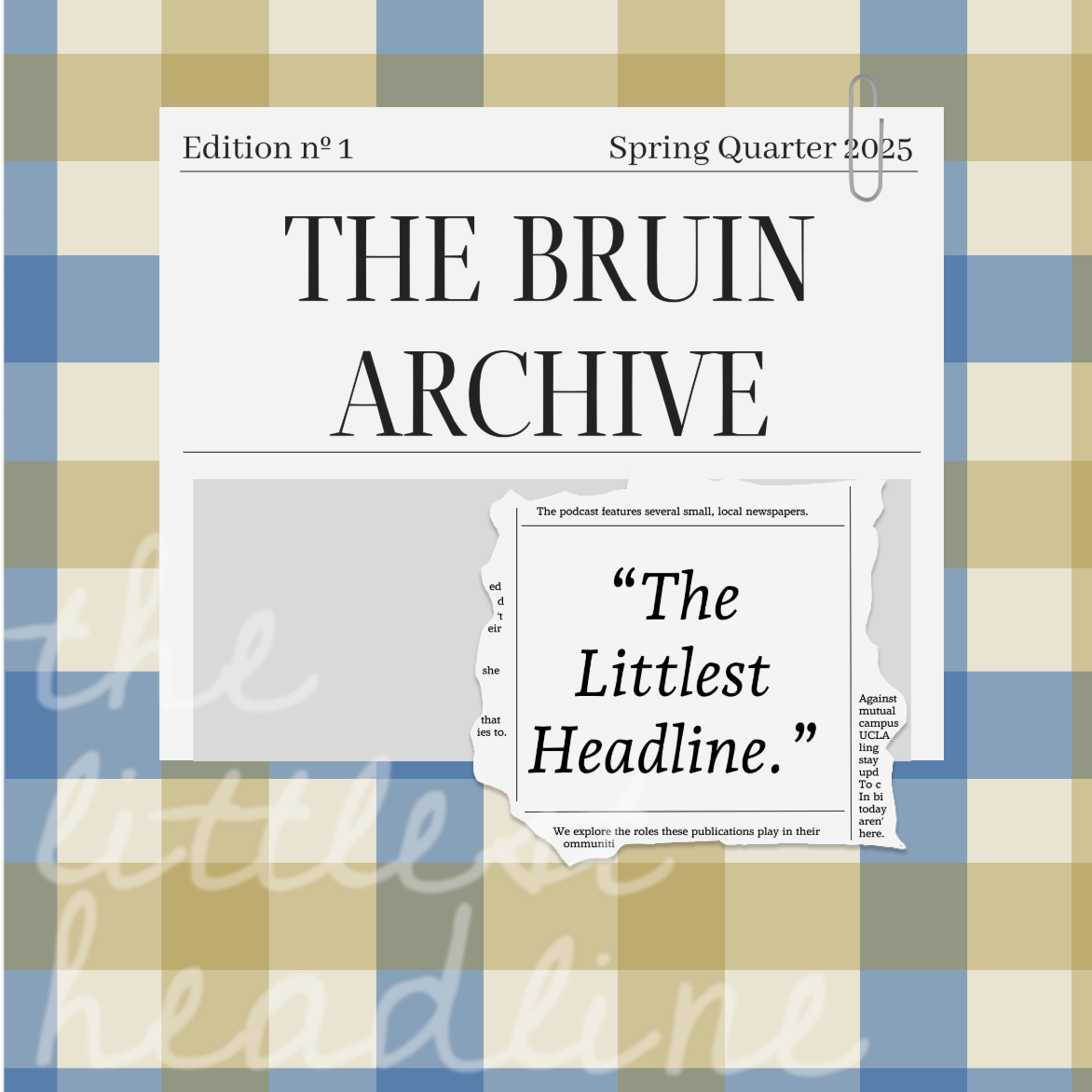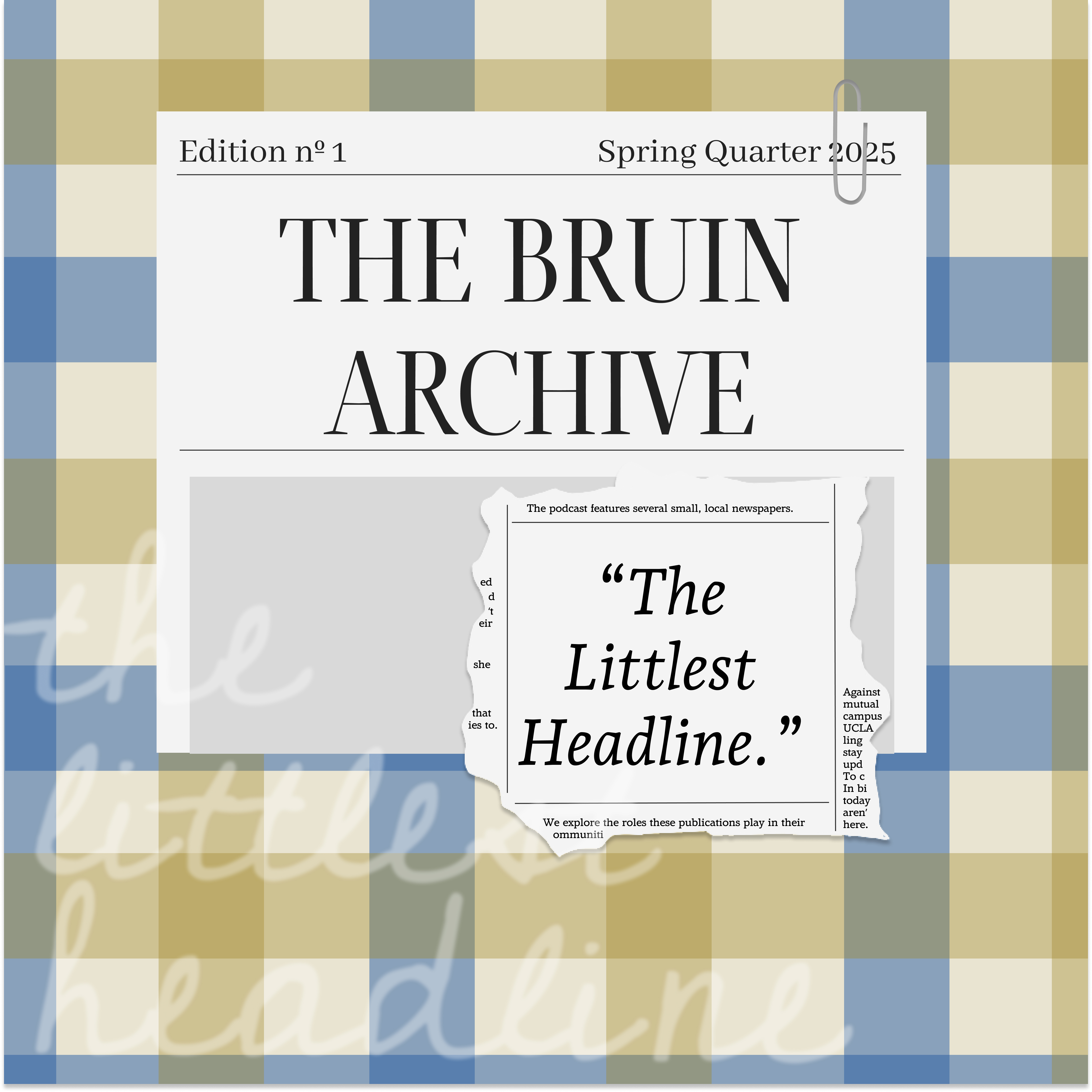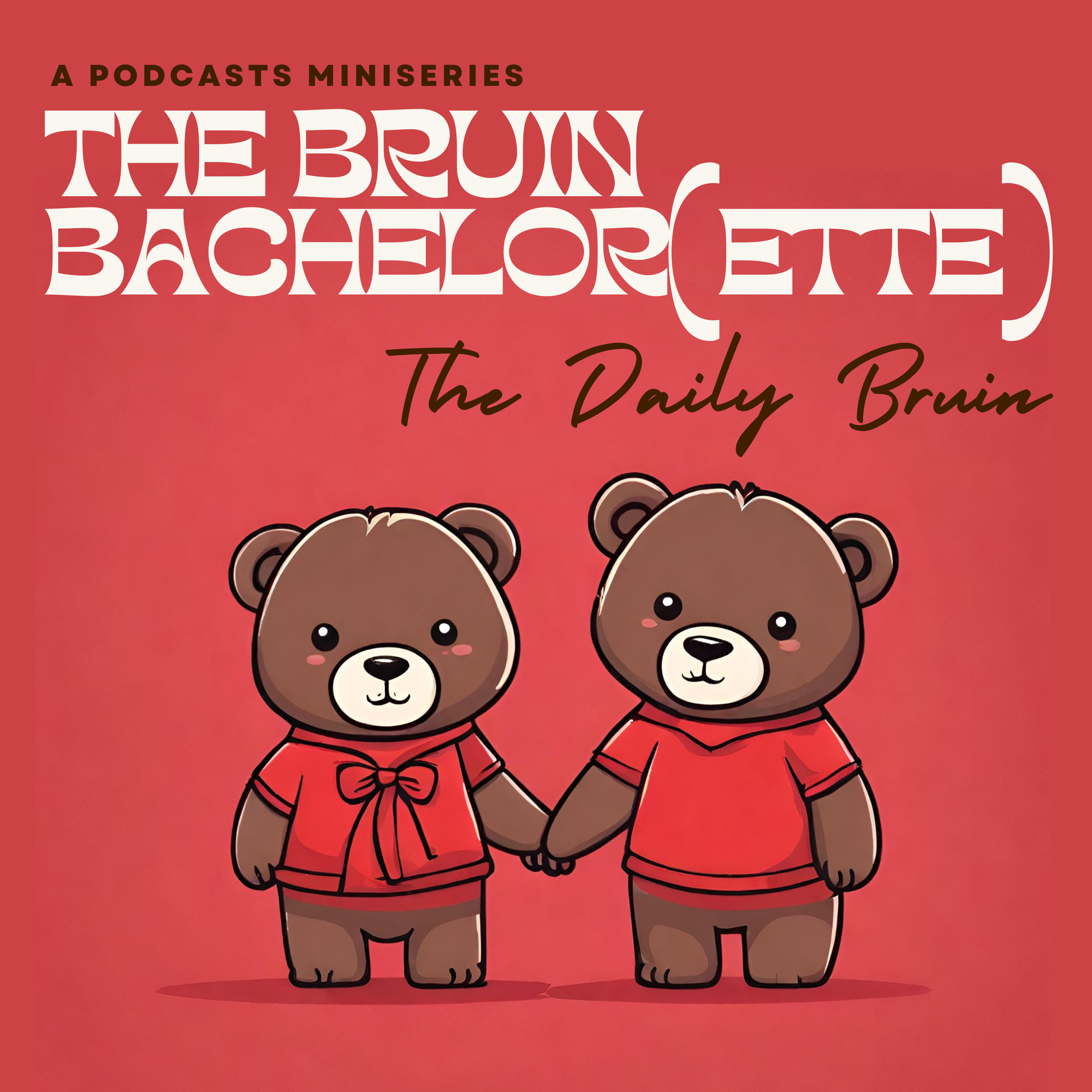The Littlest Headline: The Bruin Archive– Episode 2: Taft, California

Photo credit: Madeline Mai
By Yony Marian
June 8, 2025 8:55 p.m.
Listen to podcast contributor Yony Marian sit down with Reggie Baldwin to discuss Baldwin’s experiences growing up in Taft, California.
Yony Marian: News is just about everywhere. Bruins come from just about everywhere. It’s only fitting that we take a moment to connect those two dots, looking at news from the places that our fellow Bruins are from, and in the process, illuminate just what it’s like to move from such a place to the big, bright city of LA. That’s where I come in every episode you’ll be connected with one Bruin from a small town or county as we explore their life and the life of their home alike. My name is Yony Marian, and this is The Littlest Headline: The Bruin Archive.
Reggie Baldwin: How’s it going? My name’s Reggie. I’m an electrical engineering major here at UCLA, and I’m from Taft, California.
YM: Reggie is from Taft, California. We are happy to have you here at The Bruin Archive. Not a real building but a very real place in our hearts. This is The Littlest Headline. Like Reggie already said, he’s from Taft, California. Today we’ll be talking a little bit about Taft and his life there and his life here. We’ll be going into some of the news – the happenings in Taft, if you will. What is the paper that we’re going to be reading from called?
RB: The paper that we’re reading from is called the Midway Driller. I believe it got renamed to that maybe 10 years ago – or something like that. The Library of Congress page on it did say it used to be called the Daily Midway Driller. So, I guess they just maybe wanted to leave it a little bit up to interpretation. Same thing, basically.
YM: But it is from Taft and – whether or not it is daily – it still gives us great insight on what’s going on in Taft. But before we talk about that, let’s talk about your life now. What do you like to do at UCLA or around UCLA? What do you like about this place? What do you spend your day doing on an ideal day?
RB: An ideal day. Well, a non-ideal day is studying for 12 hours and then going to bed and then waking up the next day again.
YM: I wasn’t expecting you to be so relatable so soon.
RB: I’m just saying what actually happens. But, that’s not every day. A lot of the days I do have free time, especially on the weekends. And, in that free time, I really like to read. And then I also like to write. So, those are my two main hobbies.
YM: What kind of stuff do you write?
RB: Usually short stories, fiction – anything I’m inspired by. So I write a lot of short stories, but I want to get into writing longer stories.
YM: OK, great. Now tell us a little bit more about where you are from. Tell us a bit about Taft and what your life was like there.
RB: Yeah, so I grew up as a child in Taft, California, and I guess – not to be too bleak – but it wasn’t the optimal place to grow up. If I’m giving it a more objective judgment of it, I think there’s definitely better places to grow up than just the desert in general. But regardless, that’s where I grew up. So I made the most of it. Or actually – I didn’t make the most of it. I think there’s a lot of beautiful nature up there, especially in the summer. Most of the days I spent my time inside playing video games or just hanging out with my family while they were there. I was homeschooled, so I didn’t really make too many friends, but I still enjoyed my time. And I think it actually turned out pretty well because now it’s harder for me to feel lonely, if that makes sense. So I guess I kind of got a stat boost.
YM: So you’d say the suddenly very large amount of people here had a positive impact on your life?
RB: Yes, definitely. I think, firstly, I came to college, and I didn’t realize how difficult it was to actually talk to people. I think I definitely overestimated that after the summer before college. I went to high school for senior year in San Diego, where I did make a few friends there, some of them who are up here with me, which is nice. But the summer before college, I was in Taft, and I only saw my brother, my mom and my dad the whole summer, basically. Other than maybe going to a restaurant or something on occasion, I think definitely being in that environment where I was alone made it a little uncomfortable being in a town of so many people, but it just prepared me for Los Angeles. LA, definitely not a town for sure. But, yeah, I don’t know. I think it has its advantages and disadvantages to it. I’ve been here a year and a half now because I’m a sophomore, so I think I’ve gotten a little bit used to it, but it’s definitely a bit jarring when I go back during the summer. I think that’s what puts me off the most is the lack of – or the relative lack of people. Or just having to switch up because, here, friends are very accessible, if you like. So, I could always reach out to someone to hang out with, but when I go back home, you really don’t have any option. But this next summer, I’m actually going to San Diego because we actually moved out of Taft for a few reasons that I’m sure will come up eventually in this podcast.
YM: Yeah, we’ll dig into those. I guess first, how recently did that happen?
RB: We started moving last summer, and they went down to San Diego partially to take care of my grandparents but also just to move to a coastal city was what they wanted. The move was really only finished at the end of summer, so I basically went straight to college. I kind of have been going back between my grandparents in San Diego and then my parents in Taft, most of my life, especially for that year during high school. I guess it didn’t impact me too much because I’m kind of used to – it definitely is jarring if you did it once and you haven’t done it before, it is jarring – but after doing it so many times, I’m kind of used to it.
YM: So you said you went from the move to San Diego straight to college. Could you tell us a little bit more about what the whole process of getting into UCLA was like? Applying, making the decision to apply, and then getting in, choosing to go – what did that? What did that look like for you? And – also important – did the complete change in environment from your hometown kind of cross your mind at all?
RB: Yeah. I mean, it totally did. I think the move to – or, firstly, the decision for me to go here – is that I applied to all the UC schools and a few state schools, and basically whichever accepted me, I just picked it, and it was the closest. I preferred Southern California. I think that was the reason. Well, honestly, whatever one accepted me I just went to, and UCLA was the one. So I came here. And I think the initial move, to give a description of what it was like, the best way I can put it is that – in Taft – you feel like you’re very unique because there’s not too many people out there. I think the biggest thing I noticed when I came to LA was that you’re a person. I kind of lost a little bit of who I was, if that makes sense. Because there are so many people here that it’s not overpopulated, but there’s just so many people who have rich passions for art, engineering and all that – and athletics. You realize “Oh, wow,” the world is a lot bigger than you thought it was, and you’re really like – I guess it’s kind of bittersweet – but you’re not as special. The world doesn’t revolve around you. I guess that’s the main thing I learned, and it sounds like that’s a child’s lesson. Homeschooling was a little bit of a factor to that because obviously I got taught the education from my mom. She was the one who homeschooled me while my dad worked, but I got a little bit of high school education. But the first two years of high school I was really just getting taught educational aspects that weren’t accompanied by the social aspects of a traditional school, so that definitely also contributed to it. That’s a huge part.
YM: Now that you’re a sophomore you’ve been here for a year – and you went back after your first year, right? For summer or for winter to Taft?
RB: Yeah, for winter I went back freshman year to Taft. I was there for most of the summer until going back and forth to San Diego moving and then just came up here eventually, but I haven’t been back since last summer.
YM: Over that first year and then when you went back after all that time here, what do you think had changed about that initial sense of self– that lesson that you learned, how did being here for a year shape that?
RB: I was actually thinking about this before the podcast – a few stories. One of the stories is that I went back to Taft, and I picked up writing while I was here at UCLA.
YM: Oh, cool.
RB: So then I went back to Taft and everything in a dissociative way because I just lived in a city basically for three quarters of a year. It felt like – I don’t know how to describe it – but nothing really felt real in a really good and surrealist sense. Part of that was because I read so much fiction that, when you go to these small towns in the desert, you go there and you’re like, “Oh, this is –these are where all the stories take place.” The thrillers, the cowboy, the Westerns, and I felt like I was really just part of a fictitious story for most of it. I think it was a little – it sounds pretty bad, but it wasn’t as mentally bad as it sounds – it was pretty tame. I think. I hope I’m not dramatizing this.
YM: No, no, not at all. I just want to hear truthfully how you felt going back and forth. It sounds like you’ve got a completely new perspective on the place even though you’ve lived there after coming back.
RB: Back, yeah. It was like I needed to see something else to see Taft clearly.
YM: That’s very interesting, but it sounds like it was overall a good thing, even if you think you’re dramatizing it.
RB: Yeah, going back to Taft – I don’t know if you have looked around Google Maps maybe, or anything – but it’s basically surrounded by oil fields, right? And the newspaper is called The Driller. That’s exactly why it’s called The Driller. Almost everything is named after oil there, or something like that. But, going back to Taft, I was like, “Oh, wow.” I didn’t realize how much of a problem this place was. I think even worse now with the fires that happened in LA. Going back there, I realized, “Wow, the air pollution is pretty bad.” It’s very, very polluted. And I think the most magical part of the summer was when I went back and the flowers are blooming, usually in the summer. And I remember going to the fields, and it felt like there were as many of the drillers as the actual flowers. I don’t know what the yellow ones are called.
YM: I’m appreciating this word picture. That does sound pretty surreal.
RB: Yeah, it was a little surreal, a little horrific. But also I felt kind of – I don’t know if I should say hopeful – because it’s a pretty contentious point with the oil actually running out and people, the industry, kind of shutting down because almost all – I don’t think it’s all of the jobs in Taft – but most of the jobs in Taft are basically fueled by, the oil industry there. The way I put it is that they’re – you are – fighting for something that’s going to destroy the Earth, but they have no choice but to fight for it. So they’re kind of stuck in a loop. It’s pretty grim, but I think that was the biggest realization I had after coming back to Taft from LA after the first year.
YM: Thank you. We have just one more question before we’ll actually get into the news for this news podcast. Do you think – well, I think I might know the answer to this – but I want to ask people, is your hometown, in this case, Taft, the place you see yourself going back to after college?
RB: I would not live there. It’s for sure I would visit it. Visit the place where my parents used to live and maybe some of the restaurants and just places I’ve been to – some of the lookout spots, yeah. But really, other than that, I honestly – this is definitely dramatization – but I don’t know if it would exist in 20 to 30 years. It could be turned into a ghost town at that point the way it’s headed.
YM: Well, thank you for sharing your story and sharing a little bit about Taft.
RB: I do want to clarify, though, I do hope it doesn’t go into a ghost town.
YM: OK.
RB: That’s a good point to make. I want the best of everything. I want the people of Taft to be happy. I want them to have a stable income, but I also want the Earth to be a beautiful place and not polluted as well. That’s all I can hope for, I guess.
YM: OK, awesome. Unless there’s anything else you want to share about it, about your life there for now, I think it’s time to talk about some articles from Taft’s esteemed newspaper, The Taft Midway Driller. Let’s get into it. All right, Reggie, why don’t you tell us about the first article we’re looking at today?
RB: So, this article is about Beth Tuft, who is going to be honored among her peers when she is inducted into the Taft High School Hall of Fame on April 5. Tuft is going to be inducted because she’s had “a life spent in conservation” – in quotes from the article – and it says that Tuft began her journey as a conservationist at the age of 11, when she enlisted neighborhood friends to begin a nature investigation club. Her interest blossomed from interest to advocacy as she became aware of changes in the environment of the southern San Joaquin Valley. She credits her quality education at Taft High and Taft College, which taught her skills of writing, debate and communication and gave her the skills to develop her career in wetland protection advocacy.
YM: Have you ever been a member of a nature investigation club?
RB: I have not. I spent most of my time inside, so I guess only recently – this summer when I went back – I started exploring the outskirts of the city.
YM: Maybe one day you’ll start your own investigation club.
RB: I mean, maybe. That sounds cool. And there’s definitely a lot to investigate – I’m sure – around that place.
YM: Well, there has to be. If she’s getting honored for her investigations, there’s got to be lots of stuff to see there.
RB: Well, I think she actually got honored for something else.
YM: Yes, but it all started her investigation.
RB: Beth Tuft graduated from Cal State Fullerton with a B.A. in geography, and then she went on to teach elementary school before getting a grant to develop an environmental education program in school and regional parks, where she also worked seasonally for the National Park Service as an interpretive ranger in Yosemite.
YM: She’s done a lot of stuff. Also, I’ll add it says she got a federal grant, which is more difficult than a-
RB: True, state.
YM: But a federal grant is like-
RB: You know, from across the entire country. They got to choose you. And they chose her from a small town in California.
YM: Good for Beth Tuft.
RB: Oh yeah, definitely worthy to be honored. And it seems like there’s a lot of other stuff that she’s done too. In 1996, Tuft and other non-profit resource agency leaders created a voluntary, non-regulatory partnership to protect, restore and enhance wetlands to benefit waterfowl and other wetland species and to implement the North American Waterfowl Management Plan, which was an agreement between the U.S., Canada and Mexico. In 1982, Tuft moved to the San Francisco Bay Area to work for the Audubon Society as the director of the 900-acre Richardson Bay Audubon Center and Sanctuary. As the director of it – in her 18 years there – she accomplished many pioneering advancements for the protection and preservation of wildlife. Most notable among her achievements was the development of a regional program to protect wetland habitats to minimize human disturbance to waterfowl and wildlife and to expand education programs with Audubon chapters throughout California, Oregon and Washington. She developed and promoted the Central Coast Birding Trail in Ventura, Santa Barbara, San Luis Obispo and Monterey Counties. And she co-authored two books on gardening for wildlife for the Brooklyn Botanic Garden.
YM: What hasn’t she done? I would induct her into my Hall of Fame too if I was running one.
RB: You should get one for the Small Town Podcast Hall of Fame.
YM: Yeah, Beth Tuft can be the first person to be unofficially inducted into the Littlest Headline: The Bruin Archive Hall of Fame. Birding, wetland preservation, co-authored not one but two books for the Brooklyn Botanic Garden. It sounds like she’s done stuff all over California. And here they are honoring her in Taft. That’s really cool.
RB: Clearly, Taft played a big part in her growing into that conservationist role.
YM: That’s what I’m saying. It all started from the nature investigation club.
RB: Yes, the nature investigation club, as they dub it. Skipping ahead in the article, in February of 2024, Tuft was inducted into not only the Hall of Fame that she is going to be inducted to at the high school, but also she was inducted into the California Waterfowlers Hall of Fame for her career in wetlands conservation and restoration, receiving a commendation from the state of California and other state and federal elected officials.
YM: Not one but two Halls of Fame.
RB: Indeed.
YM: That’s really cool. I don’t know many conservationists personally, but this might be the most prolific conservationist I’ve heard of to date.
RB: True. Definitely – or, well, not definitely but even more probable – the most prolific one from Taft.
YM: Could be. At the very least, Tuft is paving the way for other – for future –Tuft conservationists. Conservation. Conservationists. That word is going to get hard to say in a second. Especially from Taft. I think I said Tuft earlier. It’s funny that her name is one letter away from the town.
RB: I’ve also probably butchered and said Taft instead of Tuft, intermixing them, maybe.
YM: After a while they get to sound similar. But just to clarify, the town we’re talking about is Taft. The very highly esteemed and well-known conservationist is named Beth Tuft. So, thank you for your story, Beth Tuft, and congratulations on being inducted into two Halls of Fame – oh, three, including this one, the littlest fake Hall of Fame. That doesn’t actually mean anything, but still, it’s symbolic.
YM: Maybe in the next episodes you’ll get some more people from other articles who are notable.
RB: Yeah, so that Tuft does not get lonely as the sole soul member of the Hall of Fame.
YM: All right, awesome. Thank you for reading that one out, that was very insightful. Let’s go on to the next article. I’ll take the next article then. This is also from the e-edition, published on February 27, 2025. This one was written by Mike Blake, and it’s called Taft Golf Preview: Young Golf team looks to build values and experience. Have you ever played golf, Reggie?
RB: I have not.
YM: I have not either. So, it’s interesting. It’ll be interesting to see our perspectives on this sport we know nothing about. I’ve played Wii Golf, but that’s not real because you’re not holding a real stick, and there isn’t a ball, and you’re not really there, and you’re in your living room. But that’s about as much exposure to-
RB: Golf as I have. It’s more than me.
YM: Not much more. But here we go. The Taft Union High School golf team’s 2024 season ended with a third-place finish at the South Sequoia League Championship at Buena Vista Golf Course last April, finishing behind Shafter and Chavez. Congratulations, Taft Union High School golf team. Taft golf coach Mike Cowan commended his 2024 squad for their sportsmanship, respect and the honorable way in which they presented themselves and the school. I’m really liking the tone of this so far. I don’t know about you, but this is sounding very-
RB: Uplifting.
YM: Uplifting, yeah. Coach Cowan’s coaching philosophy involves values and a love for the game. I’m on board with that too. He said, “I’m looking forward to a fun season with the boys on the golf course, learning the greatest game ever played.” All right. Everyone has a different idea of the greatest game. I don’t know, maybe my mind will change about golf. Not that I think golf is bad. I just have never played it, so I can’t speak to it being the greatest game or not. But let’s see if Coach Cowan can convince me. He said, “Our main focus this year will be falling in love with the game, learning how to get around any golf course efficiently and with proper etiquette, finding consistency and making square contact with the golf ball, learning strategy and course management, and becoming proficient on and around the greens.” I’m loving this. I’m loving this so far.
RB: No, his tone is honestly – I don’t know – it just makes me smile.
YM: Yeah, I mean, it sounds like he’s very much in love with the game. And that energy is coming off of this paper. How long has it been since February 20? At least a week or two after Mike Blake set these words down, Coach Cowan’s energy is still coming off through the page.
RB: He’s probably still buzzing today, if I’m going to be honest.
YM: He might be. I don’t know when golf season starts, but it could be that he’s already doing practices.
RB: They’ve probably won the championships by now.
YM: This year they almost certainly will. Coach Cowan, who has been coaching the girls at Taft since 2007 and was joined by Coach Mike Goodwin with the boys in 2013, said that he tries to teach that learning the virtues of the game of golf instills in the player honesty, responsibility, respect for others, fairness and integrity, and that those things are more important than winning golf matches. He said, “I’d much rather instill a lifelong love for the game.” All right, this guy’s very into the love for the game. I super, super definitely respect that.
RB: I need this type of passion in my life. For anything. It doesn’t have to be golf, it could be just doing homework. Honestly, if I loved the game that much, I would be unstoppable.
YM: If I had the amount of free time we’d get if we had this passion for doing homework, it would be unfathomable. But alas, we have only golf. He also said, “I’d much rather instill a lifelong love for the game and the values it promotes than win a league championship.” I think they can do both. Continuing on, he said, “I love seeing Wildcat golfers from years past at the golf course with their own kids.” Oh, wow. He really has been doing this for a long time, passing the game on to the next generation. “That doesn’t mean I’m not competitive, because I most certainly am. My philosophy came from my upbringing and the mentors I’ve been lucky to have so far in my life, including my coaching partner, Mike Goodwin.” Yeah, wow. Don’t get the wrong idea about this guy. He will still destroy you in the golf league. At least his team will.
RB: He understands that it’s complementary. The love for the game comes with the competition and the ability to win championships.
YM: How much can you love the game if you don’t really want to win it?
RB: Exactly.
YM: Coach Cowan said this year’s team will have youthful exuberance: “We’re a very young and inexperienced team,” he said. OK, weird turn there, Coach Cowan, but let’s go on. “We’re a very young and inexperienced team with only two returning players.” He said that inexperience presents a challenge. “The challenge for us this year is the fact that 11 of our 13 boys have never played the game before.” He added, “We’re starting from scratch with these guys. The good news is, Coach Mike and I don’t have any bad habits to fix with these kids, as they have no golf habits to begin with.” That’s actually a pretty sick way of looking at it.
RB: This guy needs to be an English teacher or something. He’s incredible at evoking emotion inside of me, you know?
YM: Very Dead Poets Society-esque English teacher.
RB: Yes, definitely.
YM: Coach Cowan’s golf journey began when his father, longtime Taft teacher Jim Cowan, introduced him to golf when the younger Cowan was just a child: “My dad and his buddies always brought me along with them and their boys, and we all grew to love the game.” He continued, “I’m over 40 years deep in the game, and I’m still as excited by a good round of golf as I ever was.” That’s lovely. Didn’t Confucius say something like, “If you love your work, you won’t work a day in your life,” or something like that? That sounds like Coach Cowan. Sounds like he’s emulating that.
RB: To the fullest, yeah. I don’t know what Confucius said, but someone said that. Just relating this guy to him is fair. It’s really reasonable.
YM: Yeah. Looking ahead to the 2025 season, Coach Cowan said, for team success, they will need strong play and leadership from two returning players: “Our strength is our friendship and unity.” Whoa, wait, I’m gonna read that again. “Our strength is our friendship and unity.” I feel like if I took these quotes out of context and then asked you what the article was about, golf would be pretty far down that list.
RB: Not golf, just a sport in general. It sounds like something out of a movie. It sounds so inspirational.
YM: Before you go, Reggie, there’s one question that I like asking everyone that’ll come on here. And that is: What would you say to convince people to go check out Taft?
RB: I would say that if you’ve lived in a city your whole life, going to any place in the California desert – it could be Taft, it could be maybe another county near Bakersfield – but really, any place inland where there’s not many people – it would definitely expand your view. And it will make you feel more comfortable with being by yourself, and I think that’s very important. That’s the message I want to leave people – or leave with people.
YM: OK, thank you. We’ll all take that message to heart. Thank you for that, and thank you for coming on here and sharing your story and sharing these articles. It’s been really great to have you, and it was really fun. I feel like I’ve gained a lot of insights into life in Taft, and, honestly, maybe life in general. And with that, I’m Yony Marion.
RB: I’m Reggie Baldwin.
YM: And this has been The Littlest Headline: The Bruin Archive. We will catch you in the next episode.





